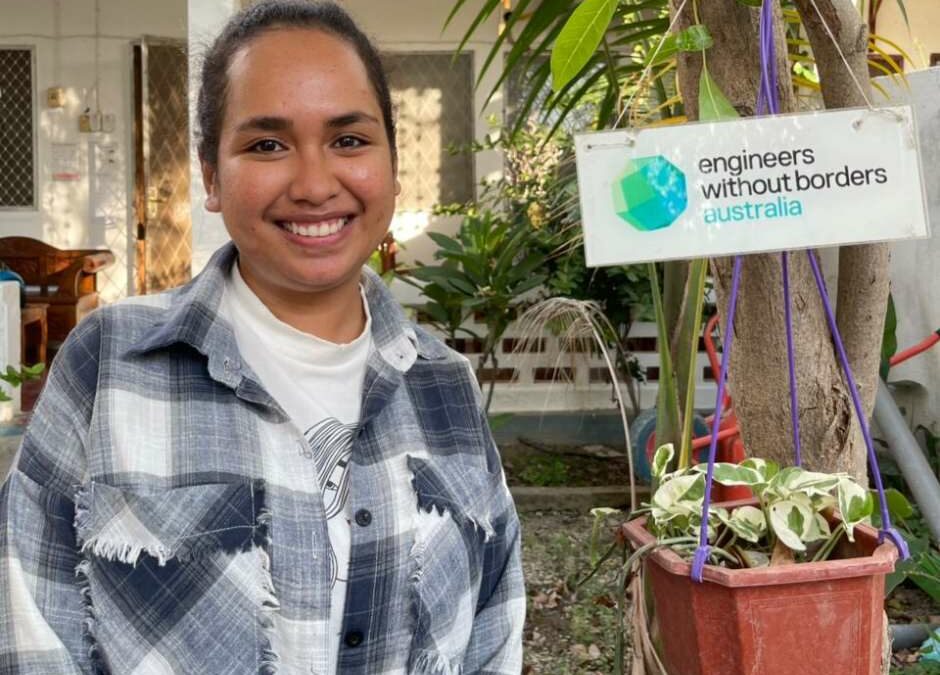We celebrate the amazing contribution of our volunteers every day! But United Nations International Volunteer Day, on December 5th each year, is a time to give an immense thanks! Volunteers are so important to EWB’s work. They dedicate time and effort to ensure the inclusion of those often left behind, drive climate action and advance the Sustainable Development Goals. We have volunteers whom support our work in Australia, and volunteers that work with our teams in-country. Chrissia is just one of them.
Chrissia, Civil Engineer
Volunteering with the EWB Australia Timor-Leste team
Q: Why did you become an Engineer?
A: During secondary school, I loved calculus and physics because I loved calculating, and when I finished school, I continued my university study and decided to study civil engineering. I want to have a variety of professions within my family, because my parents are working in the health profession, so I want to challenge myself to study in another area. This motivated me to become an engineer. After I got to know more about engineering during my university study, it was more motivating for me to become an engineer to continue to contribute to developing my beloved country Timor-Leste through the civil engineering profession.
Durante eskola sekundária, ha’u gosta matemátika no fízika tanba ha’u gosta halo kalkulasaun, no bainhira ha’u ramata eskola, ha’u kontinua estuda iha universidade no deside atu estuda iha area enjeñaria sivíl. Liután nee, ha’u hakarak iha profisaun oioin iha ha’u-nia família laran, tanba ha’u-nia inan-aman serbisu iha profisaun saúde nian, entaun ha’u hakarak dezafia ha’u-nia an atu estuda iha área seluk. Bainhira ha’u aprende liután kona-ba enjeñaria durante ha’u-nia estudu iha universidade, motiva liu tan ha’u atu sai enjeñaria ida hodi kontinua kontribui ba dezenvolvimentu ha’u-nia nasaun doben Timor-Leste liu husi profisaun enjeñaria sivíl.
Q: What was your motivation to volunteer with EWB?
A: I wanted to build my engineering knowledge and skills to contribute to my professional career as a civil engineer. Many engineering graduates have volunteered with EWB and through this they have been able to really develop their professional career. In my country Timor-Leste, the main criteria with many engineering vacancies is to have a lot of work experience. With minimum working experience it was difficult to compete for these vacancies. Through this volunteering with EWB, it has been very helpful to increase my work experience for these future job opportunities.
Ha’u nia motivasaun hodi hili voluntáriu iha EWB mak atu bele promove ha’u nia abilidade enjeñaria hodi bele kontribui ba ha’u nia karreira professional, tanba graduadu enjeñeiru barak mak voluntáriu ona iha EWB no liu husi voluntáriu iha EWB bele kontribui duni ona hodi dezenvolve sira nia karreira professional. Iha ha’u nia nasaun Timor-Leste, vaga barak mak loke iha kritériu tenke iha esperiénsia servisu ne’ebé barak, entaun ho ha’u ne’ebé iha esperiénsia servisu mínimu tebes, difikulta atu ha’u atu bele konkorre ba vaga servisu sira nee, entaun liu husi voluntáriu ida nee bele ajuda tebes ha’u atu aumenta tan ha’u nia esperiénsia servisu nian hodi bele kompete ba vaga servisu iha futuru mai.
Q: Is there a moment or experience with EWB that changed your vision or understanding of what engineering could/should be?
A: My volunteer activity with EWB has thoroughly developed my consciousness and mindset that as an engineer. I cannot only take into account my skills in my technical area, but I must also develop my skills in areas such as communication and collaboration skills. In my work as a civil engineer, I cannot work alone, I work with many people, so I need to communicate and collaborate well with other teams so that in working together, we can develop effective and sustainable engineering ideas and solutions to be implemented in the community.
Iha ha’u nia atividade voluntáriu, ha’u konsente tebes katak nu’udar enjeñeira ha’u la bele haree los de’it ba ha’u nia abilidade iha area tékniku hodi promove maibé ha’u mós tenke promove ha’u nia abilidade, liu-liu iha abilidade sira hanesan komunikasaun no kolaborasaun iha servisu ekipa, no seluk tan tanba iha ha’u nia servisu nu’udar enjeñaria civil, ha’u labele servisu mesak maibé ha’u tenke servisu ho ema barak, entaun ha’u presiza komunika no kolabora diak ho ekipa sira seluk, hodi bele hamutuk dezenvolve idea/ solusaun enjeñaria ne’ebé própriu, efetivu no sustentavel hodi bele implementa iha treinu.
Q: What is the most rewarding part of your current or most recent role with EWB?
A: The most rewarding part of my most recent roles with EWB is supporting the team in water filter project research, such as data collection on water filter use and treatment, evaluating health outcomes, and supporting the large-scale ceramic filter project planning, design, prototyping, and testing.
Parte ida-ne’ebé fó kontente liu mai ha’u-nia knaar foin daudaun ne’e ho EWB mak konaba apoia ekipa iha peskiza projetu filtra bee nian, hanesan iha kolesaun dadus kona-ba uzu no tratamentu ba filtra bee, halo avaliasaun ba rezultadu saúde husi filtra bee ne’e rasik, nomos suporta iha projetu filtra-bee ho eskala boot, liu husi halo planu, dezeñu, protótipu, no teste.


